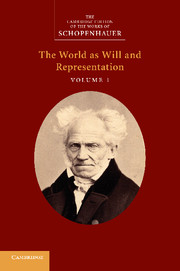Book contents
Introduction
Published online by Cambridge University Press: 06 December 2010
Summary
Schopenhauer's The World as Will and Representation was first published in Leipzig at the end of 1818 (with 1819 as the date on its title page). It consisted of a single volume, and aimed, as its 30-year-old author stated in his preface, ‘to convey a single thought’. He went on to confess, however, that ‘in spite of all my efforts, I could not find a shorter way of conveying the thought than the whole of this book’, a book that ran to over 700 pages and was not a little ambitious, ranging through epistemology, metaphysics, philosophy of mind and action, aesthetics and philosophy of art, to ethics, themeaning of life and the philosophy of religion, in an attempt to account for nothing less than the world: the nature of our cognition or knowledge of reality and how it relates to reality itself, the nature of our existence and the existence of everything in the world, what is and is not of value in existence, the pain of the human condition and the possibility of deliverance from it. Schopenhauer rounds off his book with a detailed and incisive critique of the philosophy of Kant, whom he admired and respected, but to whom he boldly applied Voltaire's saying ‘C'est le privilège du vrai génie, et surtout du génie qui ouvre une carrière, de faire impunément de grandes fautes’ (It is the privilege of true genius, and above all the genius who opens a new path, to make great errors with impunity) – words we may well have occasion to apply to Schopenhauer himself.
- Type
- Chapter
- Information
- Schopenhauer: 'The World as Will and Representation' , pp. xii - xlviPublisher: Cambridge University PressPrint publication year: 2010

